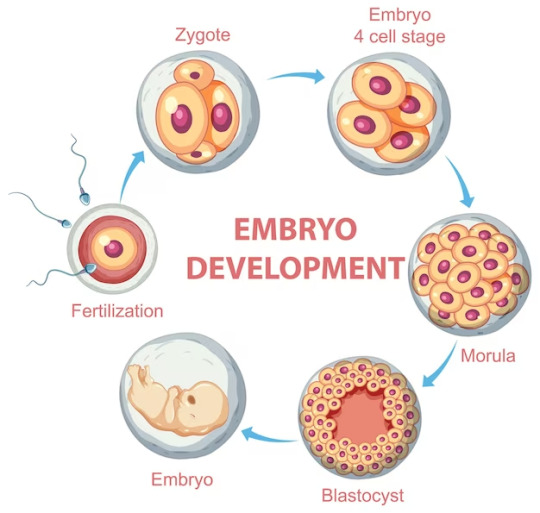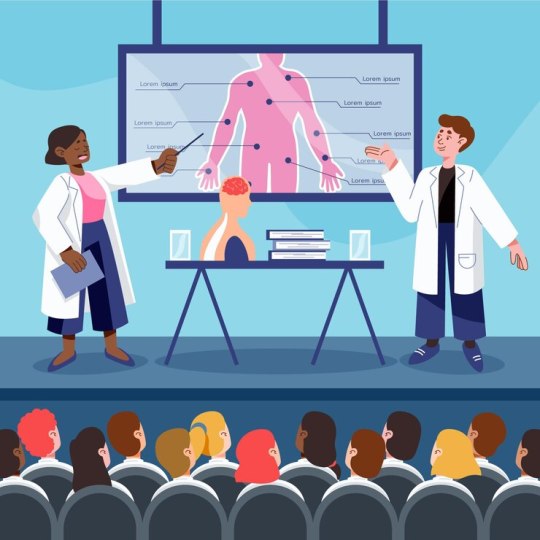#MSCinEmbryology
Explore tagged Tumblr posts
Text
Unveiling the Perfect Match: Your Guide to an MSc in Embryology
So you’ve set your sights on a MSc in Clinical Embryology — an exciting leap into the world of reproductive science! But with a multitude of colleges offering programs, picking the ideal one can feel overwhelming. Fear not, future embryologist! This guide unveils the key factors to transform your college search into a successful match.
Accreditation: The Foundation of Excellence
First things first — accreditation. Seek programs accredited by a reputable university. This ensures your chosen program meets top-notch educational standards and adheres to rigorous academic criteria. Accreditation guarantees the legitimacy and recognition of your hard-earned qualification.
Dive Deep: A Curriculum that Inspires
The curriculum is the heart of your learning adventure. Look for colleges offering a comprehensive program encompassing core topics like reproductive biology, the wonders of embryonic development, the marvels of assisted reproductive technologies (ART), essential laboratory techniques, and the ethical considerations that come with the field. Don’t forget to explore specialization options and practical training opportunities — a well-rounded education is key!
Learn from the Masters: Faculty Expertise Matters
The professors who guide you are vital. Seek out colleges with faculty boasting extensive experience in reproductive medicine, embryology, and laboratory techniques. These experts offer invaluable insights, mentorship, and guidance throughout your academic journey. Research faculty profiles — their credentials, research interests, and teaching experience will tell you a lot.
Labs Prepped for Success: Where Cutting-Edge Meets Hands-On
State-of-the-art laboratories are your playgrounds for practical learning. Choose colleges equipped with the latest technology and instrumentation used in ART. Access to cutting-edge facilities enriches your learning experience and prepares you for the real-world challenges of clinical embryology practice.
Real-World Connections: Bridge the Gap to Your Future
Colleges with strong links to fertility clinics, research institutions, and industry professionals hold immense value. Look for programs with established partnerships that offer internship opportunities, research collaborations, and the chance to network with professionals in the field. These connections can significantly enhance your career prospects and open doors to exciting opportunities post-graduation.
Success Stories: Following in the Footsteps of Excellence
Research the career paths and success rates of graduates from the program. Look for colleges with a track record of producing successful graduates who have secured positions in prestigious fertility clinics, research laboratories, academia, or other relevant areas within the field. Alumni testimonials and success stories provide valuable insights into the program’s effectiveness in preparing students for professional success.
The Final Choice: A Perfect Match for Your Dreams
Choosing the best college for your MSc in Clinical Embryology is about finding the perfect match. By prioritizing accreditation, curriculum comprehensiveness, faculty expertise, cutting-edge facilities, industry connections, and graduate outcomes, you’ll be empowered to make informed decisions that propel you towards a thriving career in the dynamic and rewarding field of clinical embryology.
0 notes
Text
The role of technology in embryology training: Enhancing learning and outcomes

Embarking on a journey into the intricate world of embryology requires not only passion and dedication but also cutting-edge training methodologies. In this article, we delve into the transformative role of technology in embryology training and explore how SEART, a pioneer in reproductive technologies, is shaping the future of aspiring embryologists.
Introduction
Embryology training serves as the bedrock for aspiring embryologists, providing the knowledge and skills necessary to navigate the complexities of reproductive sciences. As technology continues to advance, its integration into training programs has become indispensable, offering novel avenues for learning and skill development.
Traditional vs. Technology-Infused Training
Challenges in Traditional Approaches
Traditional clinical embryology training often grapples with limitations, predominantly in the form of restricted hands-on experiences and an overemphasis on theoretical aspects. Aspiring embryologists frequently find themselves yearning for more practical exposure to better prepare for the dynamic challenges of their future profession.
Advantages of Technology-Infused Training
In contrast, technology-infused training approaches offer a paradigm shift. Real-time simulations and interactive learning experiences provide a dynamic environment for students, bridging the gap between theoretical knowledge and practical application. The result is a more engaged and proficient generation of embryologists.
SEART: Revolutionizing Embryology Training
SEART stands at the forefront of this revolution, redefining how embryologists are trained. The incorporation of state-of-the-art technology into SEART's programs ensures that students are not just well-versed in the theory but are also adept at applying their knowledge in real-world scenarios.
Features of SEART's Training Programs
SEART's commitment to excellence is evident in its training programs, offering interactive virtual labs that simulate actual laboratory settings. This hands-on approach allows students to practice techniques, make decisions, and witness the consequences in a risk-free environment. Moreover, SEART provides personalized learning paths, recognizing that each student's journey is unique.
Success Stories from SEART Graduates
The impact of SEART's approach is echoed in the success stories of its graduates. These individuals not only enter the field with confidence but also contribute to advancements in reproductive sciences, showcasing the efficacy of technology-infused training methodologies.
Tailoring Education to Modern Needs
SEART's M.sc in Clinical Embryology and PG Diploma in Clinical Embryology stand as testament to the institution's commitment to staying ahead of the curve.
M.sc in Clinical Embryology with SEART
The Master of Science program at SEART integrates advanced technologies, ensuring that graduates are equipped with the latest knowledge and skills. From embryo culture techniques to genetic screening, the curriculum is designed to meet the demands of a rapidly evolving field.
PG Diploma in Clinical Embryology: A Comprehensive Overview
SEART's PG Diploma in Clinical Embryology offers a comprehensive overview of the discipline. The program covers essential topics, including fertility assessments, laboratory techniques, and ethical considerations. This diploma equips students with the expertise required for successful careers in clinical embryology.
Future Prospects for Embryologists
As technology continues to evolve, so does the role of embryologists. The integration of artificial intelligence, data analytics, and innovative laboratory techniques ensures that embryologists stay at the forefront of scientific advancements.
How Technology Keeps Embryologists Ahead
Continuous learning opportunities facilitated by technology empower embryologists to stay updated with the latest research and innovations. This not only enhances their individual skills but also contributes to the collective progress of the field.
In conclusion, the symbiotic relationship between technology and embryology training is reshaping the landscape of reproductive sciences. SEART's commitment to integrating technology into its programs ensures that aspiring embryologists are not just prepared for the present but are also poised to lead the future of reproductive medicine. Embracing this evolution is not just a choice; it's a necessity for those aspiring to excel in the dynamic realm of embryology.
#EmbryologyTraining#SEARTInnovates#FutureEmbryologists#TechInMedicine#ClinicalEmbryology#ReproductiveScience#SEARTSuccessStories#VirtualLearning#EmbryologyEducation#InnovateWithSEART#MScInEmbryology#PGDiplomaEmbryology
0 notes
Text
A Comprehensive Guide to Embryology Training Programs

Embryology, a captivating field in the realm of reproductive sciences, plays a pivotal role in the miracle of life. As technological advancements in assisted reproductive technologies (ART) continue to progress, the demand for skilled embryologists is on the rise.
SEART acknowledges this need and offers comprehensive embryology training programs to mold aspiring individuals into proficient clinical embryologists.
Embryology, the study of embryos and their development, is at the core of fertility treatments and genetic research. It encompasses understanding the growth and development of organisms from the moment of fertilization to the fetal stage. As the importance of assisted reproductive technologies grows, so does the need for qualified and proficient embryologists.
Understanding Clinical Embryology
Clinical embryology is a fascinating branch that involves the study of embryos in a clinical context. It plays a critical role in fertility treatments such as in-vitro fertilization (IVF), where embryologists handle embryos and ensure their healthy development before implantation. With technology playing a vital role in today's medical landscape, clinical embryologists are becoming increasingly essential.
Embarking on a Career in Embryology
Starting a career in embryology requires a strong academic foundation in biological sciences. A passion for understanding the intricacies of human development and a keen eye for detail are also crucial. Pursuing specialized training programs equips individuals with the necessary knowledge and skills to excel in this field.
Available Training Programs in Embryology
SEART offers two significant training programs for aspiring embryologists:
PG Diploma in Clinical Embryology
The PG Diploma in Clinical Embryology provides a comprehensive understanding of embryology, reproductive biology, and ART. This program equips students with the necessary skills to work in embryology laboratories.
MSc in Clinical Embryology
The MSc in Clinical Embryology is a higher-level program, providing an in-depth understanding of embryology, genetics, and infertility. It prepares individuals for research roles and advanced clinical practices.
SEART: Pioneering Excellence in Embryology Training
SEART, a prominent name in the field of reproductive sciences, offers world-class training in embryology. Their programs are designed to provide a perfect blend of theoretical knowledge and practical skills necessary for a successful career in clinical embryology.
Skill Development and Practical Training
Hands-on experience is paramount in embryology. SEART ensures that students receive simulated lab training and real-world exposure to embryology labs, enabling them to hone their skills and build confidence.
Job Opportunities and Career Growth
Upon completion of training, a multitude of job opportunities awaits trained embryologists. They can work in fertility clinics, research institutions, and even start their private practices. With experience, one can advance to positions like Senior Embryologist, Laboratory Director, or Research Scientist.
Testimonials and Success Stories
SEART has transformed the lives and careers of numerous individuals. Hear firsthand experiences from SEART alumni, who have successfully established themselves in the field of embryology.
Challenges and Preparing for Success
While the field of embryology is rewarding, it comes with its challenges. Overcoming these challenges requires dedication, continuous learning, and staying updated with the latest advancements in the field.
Networking and Professional Associations
Networking is essential for career growth. Joining professional associations allows embryologists to connect with peers, share experiences, and stay updated with industry trends, furthering their professional development.
Conclusion
Embryology offers an exciting and rewarding career path for those passionate about human development and genetics. SEART's training programs provide the ideal launchpad for aspiring embryologists, setting them on a path to success in this ever-evolving field. Embark on this journey, and contribute to the miracle of life through a career in clinical embryology.
#EmbryologyTraining#ClinicalEmbryology#EmbryologistTraining#PGDiplomaInEmbryology#MSCinEmbryology#SEART#FertilityScience#AssistedReproductiveTechnologies#FutureEmbryologists#CareerInEmbryology#ReproductiveHealth#EmbryologyEducation#LifeSciences#CareerGrowth#EmbryoDevelopment#EmbryologyLab#EmbryoResearch#MedicalEducation#ScientificAdvancements
0 notes